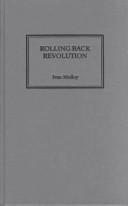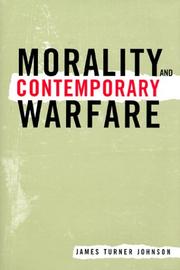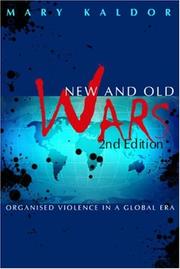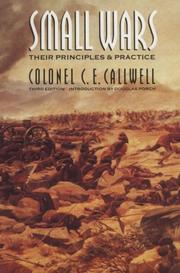| Listing 1 - 10 of 47 | << page >> |
Sort by
|

ISBN: 1849641080 0585433712 9781849641081 0745317073 9780745317076 0745317065 9780745317069 Year: 2001 Publisher: London Sterling, Va. Pluto Press
Abstract | Keywords | Export | Availability | Bookmark
 Loading...
Loading...Choose an application
- Reference Manager
- EndNote
- RefWorks (Direct export to RefWorks)
Low-intensity conflicts (Military science) --- Conflicts, Low-intensity (Military science) --- Low-intensity operations (Military science) --- Low-level conflicts (Military science) --- Operations, Low-intensity (Military science) --- Small wars --- Wars, Small --- Limited war --- United States --- Foreign relations --- Military policy.
Book
ISBN: 1107241529 1139226304 1107027381 1107699843 Year: 2013 Publisher: Cambridge : Cambridge University Press,
Abstract | Keywords | Export | Availability | Bookmark
 Loading...
Loading...Choose an application
- Reference Manager
- EndNote
- RefWorks (Direct export to RefWorks)
Counterinsurgency has staked its claim in the new century as the new American way of war. Yet, the wars in Afghanistan and Iraq have revived a historical debate about the costs - monetary, political and moral - of operations designed to eliminate insurgents and build nations. Today's counterinsurgency proponents point to 'small wars' past to support their view that the enemy is 'biddable' if the correct tactical formulas are applied. Douglas Porch's sweeping history of counterinsurgency campaigns carried out by the three 'providential nations' of France, Britain and the United States, ranging from nineteenth-century colonial conquests to General Petraeus' 'Surge' in Iraq, challenges the contemporary mythologising of counterinsurgency as a humane way of war. The reality, he reveals, is that 'hearts and minds' has never been a recipe for lasting stability and that past counterinsurgency campaigns have succeeded not through state-building but by shattering and dividing societies while unsettling civil-military relations.
Counterinsurgency --- Low-intensity conflicts (Military science) --- Counterguerrilla warfare --- Guerrilla warfare --- Insurgency --- Conflicts, Low-intensity (Military science) --- Low-intensity operations (Military science) --- Low-level conflicts (Military science) --- Operations, Low-intensity (Military science) --- Small wars --- Wars, Small --- Limited war --- History.

ISBN: 0300078374 Year: 1999 Publisher: New Haven, Conn London Yale University Press
Abstract | Keywords | Export | Availability | Bookmark
 Loading...
Loading...Choose an application
- Reference Manager
- EndNote
- RefWorks (Direct export to RefWorks)
Conflicten met lage intensiteit (Krijgskunst) --- Conflicts [Low-intensity ] (Military science) --- Conflits armés de basse intensité --- Conflits de basse intensité (Science militaire) --- Conflits de faible intensité --- Guerre de basse intensité --- Guerre non conventionnelle --- Guerres de basse intensité --- Low intensity conflicts (Military science) --- Low-intensity operations (Military science) --- Low-level conflicts (Military science) --- Operations [Low-intensity ] (Military science) --- Protracted conflicts (Military science) --- Protracted warfare (Military science) --- Small wars --- Wars [Small ] --- Low-intensity conflicts (Military science) --- War --- -Conflicts, Low-intensity (Military science) --- Operations, Low-intensity (Military science) --- Wars, Small --- Limited war --- Armed conflict (War) --- Conflict, Armed (War) --- Fighting --- Hostilities --- Wars --- International relations --- Military art and science --- Peace --- Moral and ethical aspects --- Conflicts, Low-intensity (Military science) --- War and morals

ISBN: 0815332386 Year: 2001 Publisher: New York, N.Y. Routledge
Abstract | Keywords | Export | Availability | Bookmark
 Loading...
Loading...Choose an application
- Reference Manager
- EndNote
- RefWorks (Direct export to RefWorks)
Cold War --- -Communist strategy --- Espionage --- -Ideology --- Low-intensity conflicts (Military science) --- Propaganda, International --- Security, International --- World politics --- -Collective security --- International security --- International relations --- Disarmament --- International organization --- Peace --- International propaganda --- Propaganda --- Conflicts, Low-intensity (Military science) --- Low-intensity operations (Military science) --- Low-level conflicts (Military science) --- Operations, Low-intensity (Military science) --- Small wars --- Wars, Small --- Limited war --- Knowledge, Theory of --- Philosophy --- Political science --- Psychology --- Thought and thinking --- Strategy, Communist --- Communism --- Colonialism --- Global politics --- International politics --- Political history --- World history --- Eastern question --- Geopolitics --- Covert operations (Espionage) --- Operations, Undercover (Espionage) --- Spying --- Undercover operations (Espionage) --- Intelligence service --- Spies --- Psychological aspects --- History --- -#A0201H --- International groups --- -Colonialism --- Collective security --- -Conflicts, Low-intensity (Military science) --- -Strategy, Communist --- -Psychological aspects
Multi
ISSN: 17775345 ISBN: 2738486169 9782738486165 Year: 1999 Volume: 35 Publisher: Paris : L'Harmattan,
Abstract | Keywords | Export | Availability | Bookmark
 Loading...
Loading...Choose an application
- Reference Manager
- EndNote
- RefWorks (Direct export to RefWorks)
Les Cahiers Pierre Michon font partie des publications scientifiques de critique littéraire consacrées à un écrivain particulier. C’est la revue d’une association de lecteurs créée en 2016, « Les Amis de Pierre Michon », qui a pour but de faire mieux connaître l’œuvre littéraire de Pierre Michon et de contribuer à son rayonnement. Cette association encourage les échanges, les études et les recherches en organisant ou en soutenant des colloques, séminaires, journées d’étude, conférences et autres manifestations culturelles en lien avec son œuvre. Elle propose des « Journées Pierre Michon » et anime un site Internet. Elle assure la publication annuelle des Cahiers Pierre Michon qui diffusent textes, études et documents, édités par les Presses universitaires de Rennes. Chaque numéro des Cahiers Pierre Michon s’organise en six rubriques. – La première, sous le titre « Textes de Pierre Michon », propose des textes et entretiens rares ou devenus introuvables ainsi que des inédits (extraits de carnets ou notes de l’écrivain, fac-similés et documents divers répartis dans le Cahier). – Dans la deuxième partie, un « Dossier » rassemble des études sur un thème, un livre, une question ou un aspect de l’œuvre de Pierre Michon. Il s’agit de textes de critique littéraire émanant de colloques ou suscités par le Comité de rédaction de la revue. Ce dernier lance des appels à contributions et procède à l’évaluation scientifique des études, avec l’aide éventuelle de spécialistes français ou étrangers. – La troisième rubrique, « Réception », dresse la bibliographie complète du « Dossier ». – Une quatrième rubrique, « Salutations », rassemble, sur propositions du Comité de rédaction, des textes libres – témoignages, hommages ou « saluts » à Michon… – d’écrivains contemporains, de traducteurs ou de lecteurs. – Une partie « Recensions » présente éventuellement les ouvrages récemment publiés sur l’œuvre de Pierre Michon. – La rubrique finale, « Actualité de l’œuvre », informe de toutes les publications ou manifestations récentes relatives à l’œuvre de Pierre Michon.
Low-intensity conflicts (Military science) --- Security, International --- Conflits de basse intensité --- Sécurité internationale --- Security, International. --- Collective security --- International security --- International relations --- Disarmament --- International organization --- Peace --- Conflicts, Low-intensity (Military science) --- Low-intensity operations (Military science) --- Low-level conflicts (Military science) --- Operations, Low-intensity (Military science) --- Small wars --- Wars, Small --- Limited war --- Social stratification --- National wealth --- Poverty
Book
ISBN: 0801468175 0801451868 132250475X 9780801468179 9780801451867 0801468167 Year: 2013 Publisher: Ithaca : Cornell University Press,
Abstract | Keywords | Export | Availability | Bookmark
 Loading...
Loading...Choose an application
- Reference Manager
- EndNote
- RefWorks (Direct export to RefWorks)
Most wars between countries end quickly and at relatively low cost. The few in which high-intensity fighting continues for years bring about a disproportionate amount of death and suffering. What separates these few unusually long and intense wars from the many conflicts that are far less destructive? In Logics of War, Alex Weisiger tests three explanations for a nation's decision to go to war and continue fighting regardless of the costs. He combines sharp statistical analysis of interstate wars over the past two centuries with nine narrative case studies. He examines both well-known conflicts like World War II and the Persian Gulf War, as well as unfamiliar ones such as the 1864-1870 Paraguayan War (or the War of the Triple Alliance), which proportionally caused more deaths than any other war in modern history. When leaders go to war expecting easy victory, events usually correct their misperceptions quickly and with fairly low casualties, thereby setting the stage for a negotiated agreement. A second explanation involves motives born of domestic politics; as war becomes more intense, however, leaders are increasingly constrained in their ability to continue the fighting. Particularly destructive wars instead arise from mistrust of an opponent's intentions. Countries that launch preventive wars to forestall expected decline tend to have particularly ambitious war aims that they hold to even when fighting goes poorly. Moreover, in some cases, their opponents interpret the preventive attack as evidence of a dispositional commitment to aggression, resulting in the rejection of any form of negotiation and a demand for unconditional surrender. Weisiger's treatment of a topic of central concern to scholars of major wars will also be read with great interest by military historians, political psychologists, and sociologists.
War --- Limited war. --- Low-intensity conflicts (Military science) --- Total war. --- Causes. --- Military policy --- Strategy --- Conflicts, Low-intensity (Military science) --- Low-intensity operations (Military science) --- Low-level conflicts (Military science) --- Operations, Low-intensity (Military science) --- Small wars --- Wars, Small --- Limited war --- Tactical nuclear weapons --- Causes of war

ISBN: 9780745638645 0745638635 9780745638638 0745638643 Year: 2006 Publisher: Cambridge Polity Press
Abstract | Keywords | Export | Availability | Bookmark
 Loading...
Loading...Choose an application
- Reference Manager
- EndNote
- RefWorks (Direct export to RefWorks)
Low-intensity conflicts (Military science). --- Low-intensity conflicts (Military science) --- World politics --- 824 Globalisering --- 848 Geweld --- 855 oorlogsvoering --- Conflicts, Low-intensity (Military science) --- Low-intensity operations (Military science) --- Low-level conflicts (Military science) --- Operations, Low-intensity (Military science) --- Small wars --- Wars, Small --- Limited war --- Polemology --- 858 Geweld --- 855 Oorlogsvoering
Book
ISBN: 0191839566 0192519808 0192519816 9780192519801 9780198799047 0198799047 9780191839566 Year: 2018 Publisher: Oxford : Oxford University Press,
Abstract | Keywords | Export | Availability | Bookmark
 Loading...
Loading...Choose an application
- Reference Manager
- EndNote
- RefWorks (Direct export to RefWorks)
Carl von Clausewitz has long been interpreted as the paradigmatic thinker of major interstate war. This book challenges this assumption by showing that Clausewitz was an ardent analyst of small war and integrated many aspects of his early writings on partisan warfare and people's war into his magnum opus, 'On War.' It reconstructs Clausewitz's intellectual development by placing it in the context of his engagement with the political and philosophical currents of his own times - German Idealism, Romanticism, and Humanism. The central question that Clausewitz and his contemporaries faced was how to defend Prussia and Europe against Napoleon's expansionist strategy.
Low-intensity conflicts (Military science) --- Clausewitz, Carl von, --- Criticism and interpretation. --- Conflicts, Low-intensity (Military science) --- Low-intensity operations (Military science) --- Low-level conflicts (Military science) --- Operations, Low-intensity (Military science) --- Small wars --- Wars, Small --- Limited war --- Klausewitz, Karl von, --- Klauzevit︠s︡, --- Von Clausewitz, Carl, --- Clausewitz, Karl von, --- Ḳlaʼuzvits, Ḳarl fun, --- קלאוזביץ --- Clausewitz, Carl Philipp Gottfried von,
Book
ISBN: 1317141164 1317141156 128224342X 9786612243424 0754694003 9780754694007 0754677001 9780754677000 9780754677000 9781317141167 9781317141150 6612243422 9781315580395 9781317141143 131558039X Year: 2009 Publisher: Farnham, UK Ashgate
Abstract | Keywords | Export | Availability | Bookmark
 Loading...
Loading...Choose an application
- Reference Manager
- EndNote
- RefWorks (Direct export to RefWorks)
Following on from Ethics Education in the Military which analyzed the existing theory and practice of educating soldiers, sailors and airmen in the ethics of 'old fashioned' warfaring, this volume considers the extent to which such theory and practice is adequate to prepare members of the military to meet the more complex ethical challenges faced when engaging in irregular warfare in the 21st century.
Military ethics --- Asymmetric warfare --- Counterinsurgency --- Low-intensity conflicts (Military science) --- Ethics --- Conflicts, Low-intensity (Military science) --- Low-intensity operations (Military science) --- Low-level conflicts (Military science) --- Operations, Low-intensity (Military science) --- Small wars --- Wars, Small --- Limited war --- Counterguerrilla warfare --- Guerrilla warfare --- Insurgency --- Military art and science --- Study and teaching. --- Moral and ethical aspects.

ISBN: 0803265042 0585331294 9780585331294 080326366X 9780803263666 9780803265042 Year: 1996 Publisher: Lincoln University of Nebraska Press
Abstract | Keywords | Export | Availability | Bookmark
 Loading...
Loading...Choose an application
- Reference Manager
- EndNote
- RefWorks (Direct export to RefWorks)
Low intensity conflicts (Military science) --- Tactics --- Military history, Modern --- Military & Naval Science --- Law, Politics & Government --- Military Science - General --- Modern military history --- Military tactics --- Military art and science --- Conflicts, Low-intensity (Military science) --- Low-intensity operations (Military science) --- Low-level conflicts (Military science) --- Operations, Low-intensity (Military science) --- Small wars --- Wars, Small --- Limited war --- Tactics. --- Military history, Modern.
| Listing 1 - 10 of 47 | << page >> |
Sort by
|

 Search
Search Feedback
Feedback About UniCat
About UniCat  Help
Help News
News